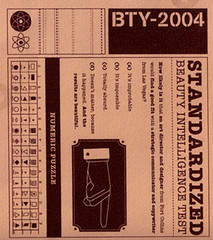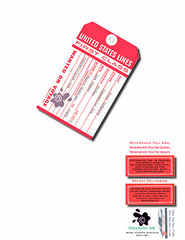Last March, Copywrite, Ink. was recognized with two awards of excellence during the Las Vegas Advertising Federation's Addy Awards, which is part of the AAF's annual competition here in Las Vegas.
While winning awards three months ago hardly seems worth the mention, it is news to us and our project partners. I received the call the day before yesterday; the Ad Fed was wondering when we were going to pick the awards up. I didn't know because I was traveling on business when the event was held.
The first award of excellence was earned for the Nevada Commission for National and Community Service's Governor's Points of Light program, which folds down into a triangular U.S. flag (not shown, but likely to be included in the portfolio section of our site redesign). Earlier in the year, it earned a Bronze Quill (top award) from the International Association of Business Communicators (IABC). We contracted Las Vegas-based 3rd Degree Burns to assist on this project. We provided creative direction and copywriting while Brian Burns executed the design and covered the press checks. We've won several awards with him.
The second piece to receive an award was our first with Colorado-based Aisle 9 Design (one panel shown here). I was especially pleased to learn this one received recognition because the piece was a cooperative self-promotional direct mailer we've been field testing in select markets. My thinking is that since the piece targets ad agency creative directors (and the judges were major market ad agency CDs), we successfully hit our target audience. I also like that the piece dispels one of the myths about award competitions: you do not need a huge project budget for a competent, creative, and effective piece.
This was the third or fourth project we've done with Ryan Burke at Aisle 9 and we're looking forward to our next. We complement each other's work well, with each building upon the other's area of expertise. Even better, it's always a positive, productive experience. I'd recommend him to anyone; but I hoping our our next gig together will be as a team.
And no, I'm not just saying this because of the award. Personally, I have mixed feelings about the abundance of awards given out in our industry. Sure, peer review can always be healthy, but sometimes there is a tendency to place too much emphasis on awards and not enough on results (I've seen too many industry folks have their feelings bruised over acrylic). The real merit of a piece should always be based on its ability to meet its objective. There are many times I've considered swearing off award competitions all together.
But then I reconsider, largely for two reasons. First, it's an excellent promotional opportunity that, as a company that agencies outsource to, always attracts the attention of our primary target audience. Second, and more importantly, since we never tell anyone what we've entered, it's always a pleasant surprise for them to learn they were recognized, client or vendor. We really do appreciate the people who work with us.
In closing, since I have yet to update the award PDFs on our site, we received recognition for a few other projects at the Bronze Quills Awards that I mentioned: a second Bronze Quill for the Southern Hills Hospital Grand Opening postcard (completed with The Idea Factory), excellences for Writing Portfolio, GPOL Silent Auction Support Letter, and merits for the Swiss Medica Trade Show Booth (with former client Eclipse), a news release for Nevada Shakespeare in the Park, and a television spot for Cadillac called Summer Trip (with longtime client The Idea Factory).
While winning awards three months ago hardly seems worth the mention, it is news to us and our project partners. I received the call the day before yesterday; the Ad Fed was wondering when we were going to pick the awards up. I didn't know because I was traveling on business when the event was held.
The first award of excellence was earned for the Nevada Commission for National and Community Service's Governor's Points of Light program, which folds down into a triangular U.S. flag (not shown, but likely to be included in the portfolio section of our site redesign). Earlier in the year, it earned a Bronze Quill (top award) from the International Association of Business Communicators (IABC). We contracted Las Vegas-based 3rd Degree Burns to assist on this project. We provided creative direction and copywriting while Brian Burns executed the design and covered the press checks. We've won several awards with him.
The second piece to receive an award was our first with Colorado-based Aisle 9 Design (one panel shown here). I was especially pleased to learn this one received recognition because the piece was a cooperative self-promotional direct mailer we've been field testing in select markets. My thinking is that since the piece targets ad agency creative directors (and the judges were major market ad agency CDs), we successfully hit our target audience. I also like that the piece dispels one of the myths about award competitions: you do not need a huge project budget for a competent, creative, and effective piece.
This was the third or fourth project we've done with Ryan Burke at Aisle 9 and we're looking forward to our next. We complement each other's work well, with each building upon the other's area of expertise. Even better, it's always a positive, productive experience. I'd recommend him to anyone; but I hoping our our next gig together will be as a team.
And no, I'm not just saying this because of the award. Personally, I have mixed feelings about the abundance of awards given out in our industry. Sure, peer review can always be healthy, but sometimes there is a tendency to place too much emphasis on awards and not enough on results (I've seen too many industry folks have their feelings bruised over acrylic). The real merit of a piece should always be based on its ability to meet its objective. There are many times I've considered swearing off award competitions all together.
But then I reconsider, largely for two reasons. First, it's an excellent promotional opportunity that, as a company that agencies outsource to, always attracts the attention of our primary target audience. Second, and more importantly, since we never tell anyone what we've entered, it's always a pleasant surprise for them to learn they were recognized, client or vendor. We really do appreciate the people who work with us.
In closing, since I have yet to update the award PDFs on our site, we received recognition for a few other projects at the Bronze Quills Awards that I mentioned: a second Bronze Quill for the Southern Hills Hospital Grand Opening postcard (completed with The Idea Factory), excellences for Writing Portfolio, GPOL Silent Auction Support Letter, and merits for the Swiss Medica Trade Show Booth (with former client Eclipse), a news release for Nevada Shakespeare in the Park, and a television spot for Cadillac called Summer Trip (with longtime client The Idea Factory).

















